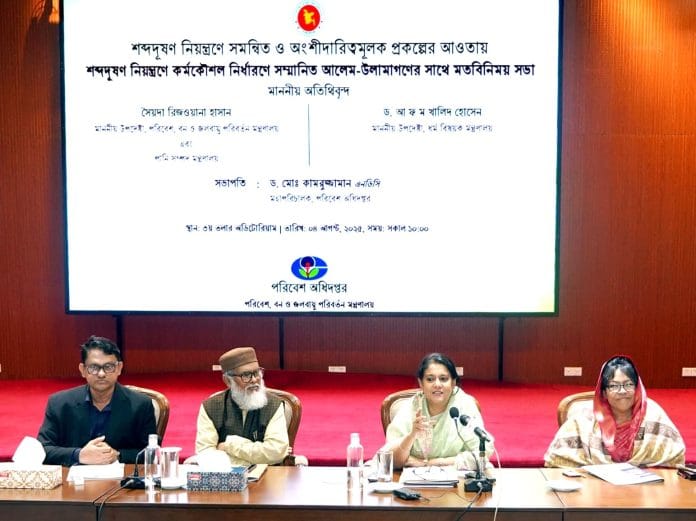The government is seeking the active support of Islamic scholars in its campaign to combat noise pollution, Environment, Forest and Climate Change Adviser Syeda Rizwana Hasan said on Monday.
Speaking at a consultation meeting held at the Department of Environment in Dhaka, Rizwana Hasan expressed optimism that religious leaders would soon submit specific recommendations and action plans to help address the issue.
“In many countries, noise pollution has been reduced through a joint effort by governments and citizens,” she said. “We want to take similar steps in Bangladesh. We don’t want to stop at speeches—we are ready to take real action. We must develop a regulated noise management system for concerts, ambulances, and the transport sector.”
The meeting brought together prominent Islamic scholars from across the country, who were urged to incorporate environmental messages into their sermons—such as discouraging plastic use, preventing hill cutting, and halting illegal stone extraction.
“Religious platforms can be powerful tools to influence behavior. Sermons grounded in the Quran and Hadith can play a major role in raising public awareness,” Rizwana Hasan said.
Dr A.F.M. Khalid Hossain, Adviser to the Ministry of Religious Affairs, highlighted the Islamic teachings on moderation in sound. “Excessive use of loudspeakers, especially late at night, disturbs children, the elderly, and the sick. Noise pollution is not just a hearing issue—it affects the nervous system and goes against the principles of Islam,” he said. He also criticized the unnecessary use of horns and loud sounds in public places.
Other speakers at the event included Dr Farhina Ahmed, Secretary of the Ministry of Environment, Forest and Climate Change; Dr Md Kamruzzaman NDC, Director General of the Department of Environment; Professor Dr Kamrul Hasan Torofdar, Secretary General of the ENT Head-Neck Cancer Foundation; Md Abdullah Al Masud, Director (Deputy Secretary, Administration), Department of Environment; and Farid Ahmed, Project Director of the Integrated and Participatory Noise Control Project.
Islamic scholars attending the meeting agreed to submit a set of recommendations to the government to help reduce noise pollution through faith-based advocacy.
“We will disseminate Quran- and Hadith-based messages to raise environmental awareness,” Rizwana Hasan said in her concluding remarks. “With collective efforts rooted in religious values, we can build a more environmentally conscious Bangladesh.”

